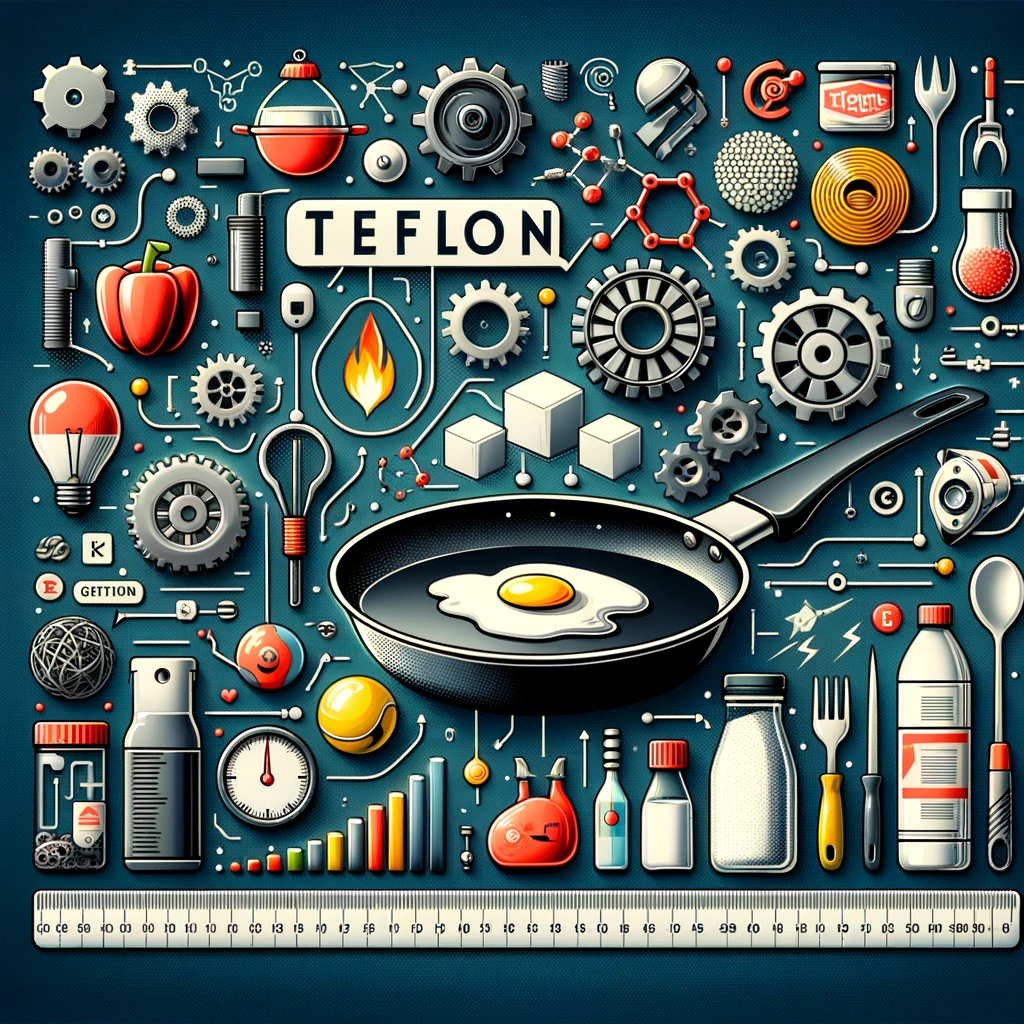The density of Teflon, a polymer also known by its chemical name polytetrafluoroethylene (PTFE), is approximately 2.2 g/cm³. Teflon is renowned for its remarkable properties, including its high melting point, non-stick nature, chemical inertness, and low coefficient of friction, which make it a versatile material used in a wide range of applications.
Understanding Teflon’s Unique Characteristics
Teflon’s unique characteristics stem from its molecular structure, particularly the presence of fluorine atoms surrounding the carbon backbone, which imbues the material with several distinctive properties that set it apart from other polymers. These attributes not only define Teflon’s applications but also highlight its importance in various industries.
The non-reactivity of Teflon is a hallmark feature, making it resistant to almost all chemicals. This chemical inertness ensures that Teflon does not degrade or react under typical conditions, even when exposed to strong acids, bases, or solvents. Such resistance is invaluable in chemical processing equipment, where maintaining purity and preventing contamination are critical.
Additionally, Teflon’s very low coefficient of friction, one of the lowest of any solid material, results in its famed non-stick property. This feature minimizes energy loss in mechanical systems and prevents materials from adhering to surfaces, which is beneficial in applications ranging from non-stick cookware to industrial machinery and protective linings.
Its excellent dielectric properties make Teflon an outstanding insulator, crucial for use in the electronics industry where it insulates wires and cables, maintaining signal integrity, especially at high frequencies.
These unique characteristics—chemical inertness, low coefficient of friction, and excellent dielectric properties—result from Teflon’s stable molecular structure, reinforcing its role as a versatile and indispensable material in diverse applications.
High Melting Point and Thermal Stability
In industrial contexts, Teflon’s thermal stability makes it an ideal choice for components and machinery exposed to high temperatures, such as in the automotive, aerospace, and chemical processing industries. Its resistance to heat contributes to the longevity and reliability of parts and equipment, reducing maintenance needs and downtime while ensuring operational safety and efficiency.
Moreover, Teflon’s thermal properties extend beyond its resistance to high temperatures. It also demonstrates remarkable stability at low temperatures, maintaining its flexibility and mechanical strength in cold environments. This characteristic makes Teflon suitable for applications in cryogenics and other settings where materials must perform under a broad range of temperatures.
In summary, Teflon’s high melting point and thermal stability are central to its functionality and appeal across a wide array of applications. These properties, rooted in its robust molecular structure, enable Teflon to perform reliably in demanding thermal conditions, whether in everyday consumer products or specialized industrial equipment. The material’s ability to withstand extreme temperatures without degrading or altering ensures its continued utility and relevance in various fields, from culinary arts to cutting-edge scientific research.
Non-Stick Nature and Low Coefficient of Friction
One of the most well-known properties of Teflon is its non-stick characteristic, which is attributed to its low coefficient of friction. This property ensures that food does not adhere to cookware surfaces, making Teflon-coated pans popular in kitchens worldwide. Beyond culinary uses, the low friction of Teflon is advantageous in manufacturing processes, where it minimizes wear and energy consumption in machinery components.
What is Teflon mostly used for?
Teflon, known for its distinctive non-stick properties, is predominantly used for cookware and kitchen utensils. Its application in pots, pans, baking trays, and utensils revolutionized cooking by reducing the need for cooking oils or fats and making cleanup easier. However, Teflon’s uses extend well beyond the kitchen:
- Industrial Applications: Teflon is employed in various industries due to its resistance to heat and chemicals. It is used in the manufacturing of chemical containers, pipes, and valves to prevent corrosion and chemical reaction.
- Textile Industry: Teflon coatings are applied to fabric to produce waterproof, yet breathable clothing. It’s also used in upholstery, carpets, and outdoor gear to repel stains and water.
- Automotive Industry: In vehicles, Teflon is utilized in windshield wiper blades to provide a smoother glide across the glass and in hoses and seals to resist harsh fluids and high temperatures.
- Aerospace and Aviation: Its ability to withstand extreme temperatures and chemical reactions makes Teflon valuable in aerospace engineering for coated wiring, fuel hoses, and other components.
- Electronics: Due to its excellent insulating properties, Teflon is used in the insulation of wiring and as a protective coating for printed circuit boards.
- Medical Field: Teflon’s inertness and biocompatibility allow its use in medical devices and implants, including catheters and joint replacements.
Teflon’s versatility across various industries can be attributed to its unique properties like non-stickiness, chemical inertness, heat resistance, and electrical insulation, making it a vital material in many applications beyond cookware.
Chemical Inertness and Corrosion Resistance
Teflon is chemically inert, meaning it does not react with most chemicals, making it ideal for applications in the chemical industry. Its resistance to corrosion contributes to its longevity and reliability in harsh chemical environments, such as in containers and pipework for aggressive substances.
Applications Beyond the Kitchen
While Teflon is widely recognized for its use in non-stick cookware, its applications extend far beyond the kitchen, impacting various industries due to its unique properties. In the industrial sector, Teflon’s resistance to high temperatures and chemicals makes it an ideal material for machinery parts and protective coatings. For instance, it is used in hoses, gaskets, and seals that need to withstand corrosive substances and extreme conditions, ensuring longevity and reliability of industrial equipment.
In the field of electronics, Teflon’s excellent insulating properties are invaluable. It is used in the insulation of cables and wires, particularly in applications that require stability across a wide range of temperatures and resistance to electrical interference. This makes it essential for critical and high-performance environments like aerospace and computing.
The automotive industry benefits from Teflon’s durability and friction-reducing qualities. It is utilized in components such as bearings, seals, and gaskets, helping to reduce maintenance needs and improve the lifespan and efficiency of automotive parts.
Furthermore, Teflon’s biocompatibility has led to its use in the medical field. It is employed in various medical devices, including catheters and surgical instruments, where its non-reactive nature is crucial to prevent adverse reactions and ensure patient safety.
Even in the realm of textiles, Teflon has made its mark, providing stain resistance and water repellency to fabrics, thus enhancing the durability and utility of outdoor and performance clothing.
These varied applications underscore Teflon’s versatility and the significant role it plays in modern technology and industry, transcending its common association with kitchen cookware to provide solutions across a broad spectrum of fields.

